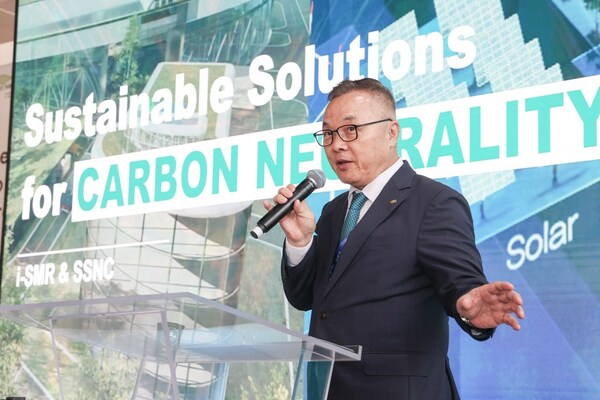DUBAI, UAE, Dec. 2, 2023 /PRNewswire/ — Korea Hydro & Nuclear Power (KHNP), the state-run energy company of Korea, hosted an event titled, ‘The Role of Nuclear Energy in Accelerating a Carbon-Free Future,’ today at the KHNP Pavilion during the 28th United Nations Climate Change Conference (COP28). This event showcased Korea’s innovative net-zero nuclear solutions and explored the crucial role of nuclear energy in expediting the energy transition to reach a carbon-free future with renowned specialists from the sector.
The session commenced with opening remarks by Hoesung Lee, President of the Carbon Free Alliance (CFA) and former Chair of Intergovernmental Panel on Climate Change (IPCC). Emphasizing the urgency for developing a diverse range of environmentally friendly clean energy sources for achieving carbon neutrality, Lee stated that "in order expand carbon-free energy globally, participation from various stakeholders and implementation of innovative technologies will be crucial."
Taking the stage next, KHNP CEO Jooho Whang introduced Korea’s innovative small modular reactors (i-SMR) technology and SMR Smart Net-Zero City (SSNC) model. "i-SMR technology is a sustainable clean energy solution. It represents all the advantages of large nuclear reactors, with utmost safety, cost-efficiency and flexibility," CEO Whang disclosed. He continued, "[Powered by i-SMR,] SSNC is a carbon-free energy city platform, providing optimal green energy portfolio to each city," before adding, "By using stable, cost-effective i-SMR technology, SSNC can reduce energy costs by up to 30%."
The presentation was followed by a panel discussion titled, "The Role of Nuclear Energy in Accelerating a Carbon-Free Future," where nuclear energy experts and industry leaders acknowledged nuclear power as a clean and critical solution for decarbonization. They also highlighted the significant potential of small modular reactors (SMRs) in driving the global energy transition.
Joining CEO Whang on the panel were Diane Cameron, Head of Division of Nuclear Technology Development and Economics, NEA, Bumjin Chung, Professor of Nuclear Engineering Department at Kyung Hee University / President of Korean Nuclear Society, and Frank Jannuzi, CEO of The Maureen and Mike Mansfield Foundation, with Hyungook Kang, Professor of Dept. of Mechanical, Aerospace, and Nuclear Engineering at Rensselaer Polytechnic Institute, as the moderator.
During the session, Ms. Cameron stressed the critical and timely moment for nuclear energy, stating, "Advanced nuclear energy technologies, including the new SMRs coming to market, now offer nations everywhere an opportunity to leapfrog the energy systems of yesterday to bring the benefits of clean power to the 770 million people in the world who currently live without electricity today."
Dr. Chung continued the discussion by highlighting the history, achievements, and future of Korea’s nuclear technology. "40 years of steady nuclear power plant construction resulted in the balanced human resources and supply chains… We are now technologically ready for NZE (Net Zero Emission)."
CEO Whang added, "With superior safety, economic viability and modularity in the SMR market, i-SMR represents a contemporary solution for a carbon-neutral future. Especially for countries with aging coal power plants, i-SMRs could be an essential solution, offering carbon-free energy at a more affordable cost while facilitating a safe and economically beneficial transition to clean energy."
CEO Jannuzi emphasized the need to build support for nuclear power and collaborate on a global scale, stating, "It’s not just that nuclear power provides carbon-free power, it is also that nuclear power offsets pollution which would otherwise be generated by fossil fuels – saving lives… There is a compelling logic for the United States, the Republic of Korea, and Japan to work together to deliver safe, efficient nuclear energy to meet growing global energy demands."
Dr. Kang closed the panel discussion by stating that "Nuclear power has emerged as a pivotal solution for driving the transition to net zero and a more sustainable future. Though challenges still lie ahead, it is promising to see companies like KHNP leading the energy transition with developments in their affordable, secure and effective i-SMR technology and smart net zero city model."
Prior to this KHNP-hosted event, Korea’s Trade, Industry and Energy Vice Minister Kyungsung Kang attended the Net Zero Nuclear (NZN) Initiative event at COP28 and announced that in alignment with the Korean government’s commitment to reducing greenhouse gas emissions, Korea will place increased emphasis on nuclear energy. KHNP’s development of i-SMR and SSNC in collaboration with the Korean government and corporations is aligned with these national objectives.
In addition, on Dec 1, KHNP signed a Memorandum of Understanding (MoU) with Indonesia’s Perusahaan Listrik Negara Nusantara Power at COP28. The MOU aims to foster collaboration in the development and research of i-SMR technology, with a shared objective of contributing to the global net zero goal.


